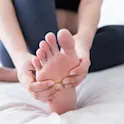
Neuroscience
06 Sep 2016
Relaxing your feet affects your hands
by Conn Hastings, Frontiers Science Writer By relaxing flexed muscles in your foot, you can reduce the ability of your hands to respond to stimulation known as excitability, a study published in the open-access journal Frontiers in Human Neuroscience found. Although this result might sound bizarre, movement in one limb interfering with movement in another is something you have probably discovered yourself. Anyone who has ever tried to rub their head while patting their belly can confirm this – failing at that wasn’t your fault either, although it was pretty humorous. The muscles in your body contract to pull on your bones and relax to release them again, in response to neural impulses. This forms the basis of movement. However, coordinating both muscle contraction and relaxation is essential for normal physical activity. Rapidly switching between these states is particularly important in activities where complex movements are required, like sports or playing musical instruments. While the balance between muscle relaxation and contraction is important, they are distinct processes in their own right. Brain imaging studies show that specific areas of the brain activate during muscle relaxation, indicating that it is an independent and active neurological process, and not merely the end or […]













